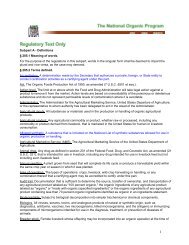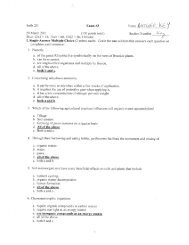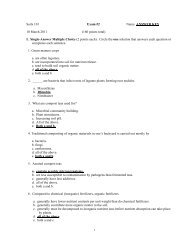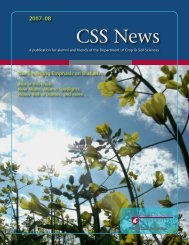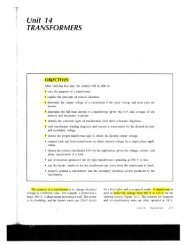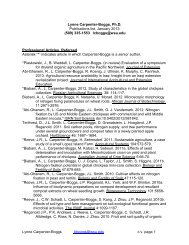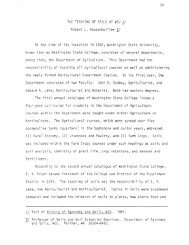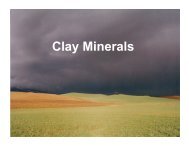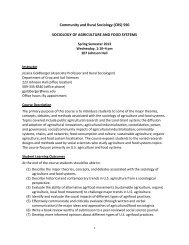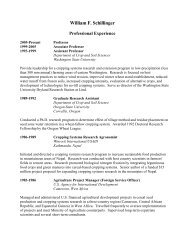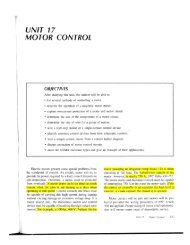2012 Dryland Field Day Abstracts - Dept. of Crop and Soil Sciences ...
2012 Dryland Field Day Abstracts - Dept. of Crop and Soil Sciences ...
2012 Dryland Field Day Abstracts - Dept. of Crop and Soil Sciences ...
You also want an ePaper? Increase the reach of your titles
YUMPU automatically turns print PDFs into web optimized ePapers that Google loves.
Farm Overview Page 15<br />
Wilke Research <strong>and</strong> Extension Farm<br />
The Wilke Research <strong>and</strong> Extension Farm is located on the east edge <strong>of</strong> Davenport, WA. The 320-acre farm was bequeathed to WSU<br />
in the 1980’s by Beulah Wilson Wilke for use as an agricultural research facility. Funding for the work at the Wilke Farm comes<br />
from research <strong>and</strong> extension grants <strong>and</strong> through the proceeds <strong>of</strong> the crops grown. The farm has been under a direct seed or no-till<br />
farming system since 1998 <strong>and</strong> the goals for research are centered on the need to develop cropping systems that enhance farm<br />
pr<strong>of</strong>itability <strong>and</strong> improve soil quality.<br />
The Wilke Farm is located in the intermediate rainfall<br />
zone (12-17 inches <strong>of</strong> annual precipitation) <strong>of</strong> eastern<br />
Washington in what has historically been a<br />
conventional tillage, 3-year rotation <strong>of</strong> winter wheat,<br />
spring cereal (wheat or barley), followed by summer<br />
fallow. Historically wheat is the most pr<strong>of</strong>itable crop in<br />
the rotation <strong>and</strong> the wheat-summer fallow rotation<br />
has been the most pr<strong>of</strong>itable system.<br />
The Wilke farm is split by State Highway 2. The north<br />
side has been in continuous winter or spring cereal<br />
production for approximately 19 years <strong>and</strong> being<br />
cropped without tillage for the past 14 years. Since<br />
1998, the south side has been dedicated to the Wilke<br />
Research Project that is testing a direct seed, intensive<br />
cropping system. The south side <strong>of</strong> the Wilke Farm was<br />
divided into 21 separate plots that are 8 to 10 acres in<br />
size <strong>and</strong> farmed using full-scale equipment. In 2003<br />
Wilke Farm field tour 2010<br />
these plots were combined into 7 separate plots<br />
approximately 27 acres in size. Three plots remain in a 3<br />
-year crop rotation that includes winter wheat, no-till<br />
(chemical) fallow, <strong>and</strong> spring crop. Four plots remain in a 4-year crop rotation that includes winter wheat, no-till fallow, spring<br />
cereal <strong>and</strong> spring crop. <strong>Crop</strong>s grown on the farm since the inception <strong>of</strong> the Wilke Project include barley, winter <strong>and</strong> spring wheat;<br />
canola, peas, safflower, sunflowers, yellow mustard, <strong>and</strong> proso millet. The farm provides research, demonstration, education, <strong>and</strong><br />
extension activities to further the adoption <strong>of</strong> direct-seeding systems in the area. In addition to the large plots, the Wilke Farm is<br />
used increasingly for small plot research by WSU faculty, other University faculty, <strong>and</strong> private company researchers for small plot<br />
cropping systems research.<br />
Due to its location <strong>and</strong> climate, the Wilke Farm complements other WSU dryl<strong>and</strong> research stations in the Palouse area <strong>and</strong> at Lind<br />
<strong>and</strong> other locations in the region such as north central Oregon.



